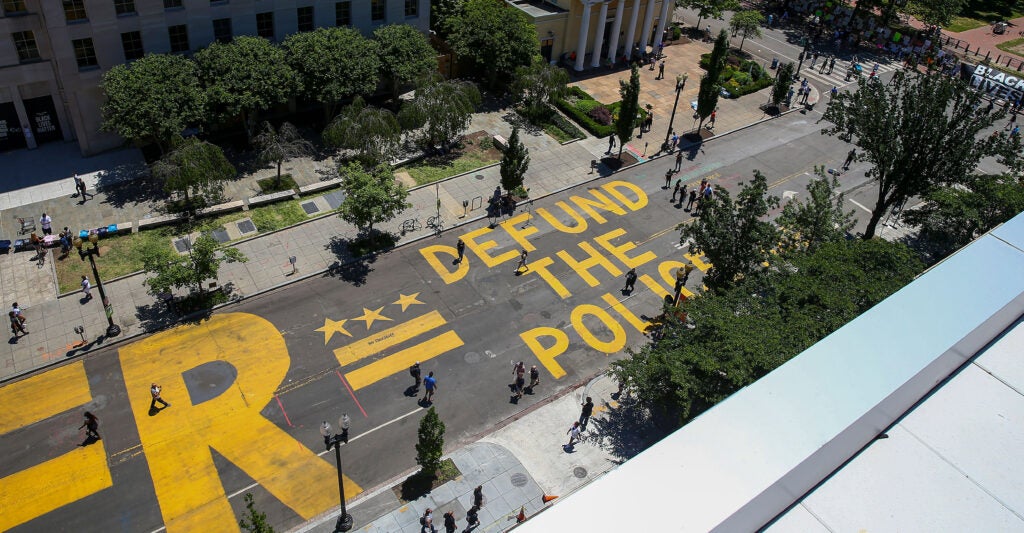Having served as the chief of police for three suburban law enforcement agencies just outside of Washington, D.C., I have watched with concern—though not surprise—as crime in the nation’s capital has skyrocketed over the past year, even as the number of police officers serving with the city’s Metropolitan Police Department has dropped to a half-century low.
Amid that alarming backdrop, it’s no wonder that D.C. Mayor Muriel Bowser and the D.C. Council have changed their tune since the start of the “defund and defame the police” movement in 2020—just like so many other politicians in cities nationwide.
The knee-jerk reaction in the District of Columbia and in most other major cities after George Floyd’s death in May 2020 was to cut police funding, demonize the officers serving, and enact soft-on-crime policies. In its aftermath, crime has soared to levels not seen in decades, and we now have the fewest number of police officers in America per resident than at any time in more than 25 years.
Now, with the public in an uproar, those same elected officials in the District and elsewhere are reversing course. They now want more officers who are properly equipped and trained, and they want tougher penalties for criminal behavior.
In other words, they want things the way they were before the “defund and defame the police” movement.
Better late than never, I suppose. But, for retired law enforcement leaders like me who were sitting on the sidelines while our profession was being vilified and scapegoated over the past few years, it was easy to be bitter and frustrated.
In 2019, our nation had never been safer. The violent crime rate had steadily and dramatically declined since peaking in 1991. The policing ranks were full. Our officers were well-qualified. They were better educated, better equipped, and better trained than ever before. Policing had earned a reputation of trust and professionalism, and the prevailing philosophy among law enforcement leaders was “we want to do even better.”
Before 2020, I know from experience, there was great pride in wearing the badge, and officers knew they had the support of the public, their elected leaders, and police officials. Now, after more than three years of “defunding and defaming,” I am afraid law enforcement’s rank and file are suffering from an understandable crisis of trust and confidence.
Most rightly feel they are on an island when it comes to political, media and, yes, even internal scrutiny of any serious use-of-force case. They not only worry about potential internal sanctions, they fear criminal prosecution for simply doing their job.
One officer who left the profession explained it this way: “We are one bullet away from death and one mistake away from indictment.”
We have all seen rogue, unqualified prosecutors winning local elections based upon promises not to get tough on criminals, but to more aggressively prosecute police officers.
It’s no wonder that we saw a 47% increase in officer resignations from 2019 to 2022, along with a 19% rise in retirements during that same period.
According to a Police Executive Research Forum survey, the number of sworn officers dropped nearly 5% between the end of 2019 and the beginning of 2022. That’s a loss of some 40,000 officers nationwide.
The police shortage crisis that we are now facing is the most glaring unintended consequence of the “defund the police” movement, and it’s jeopardizing public safety and placing added stress on a police workforce already stretched thin.
To fill vacancies, police chiefs have convinced elected officials of the need for hiring bonuses—some as high as $75,000.
Meanwhile, many agencies have significantly reduced—or even eliminated—their hiring standards to attract a larger applicant pool. The latter is both reckless and dangerous. While desperate times require desperate measures, we must be careful that only those who are committed to policing and fit for the job are given a badge.
I have been told by police academy instructors and field training officers that they basically cannot “fail” a poorly performing recruit. And veteran officers understandably do not want to work side-by-side with a new officer that is substandard and incapable of making split-second life-or-death decisions.
The future of our profession—and public safety—is at a crossroads. Increased police funding and tougher penalties for criminal acts will help right the ship. But if we fail to reestablish clear and strong support from the public, our police leaders, and our elected officials for officers who want to do their job without fear of wrongful condemnation, termination, and prosecution, we will lose many more of the good men and women needed to serve and protect our communities.
The stakes are high. It’s time to wake up to this crisis of trust and confidence within policing.
The Daily Signal publishes a variety of perspectives. Nothing written here is to be construed as representing the views of The Heritage Foundation.
Have an opinion about this article? To sound off, please email letters@DailySignal.com and we’ll consider publishing your edited remarks in our regular “We Hear You” feature. Remember to include the URL or headline of the article plus your name and town and/or state.
